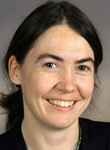Bean to help steer U.S. role in Euclid mission
By Susan Kelley

A Cornell astronomer has been chosen to play a key role in a mission to better understand how the universe has been expanding and of what it is made.
Rachel Bean, associate professor of astronomy, is on the steering committee of the largest of three U.S.-based teams recently selected by the European Space Agency to participate in its Euclid mission.
Euclid is a space telescope designed to probe the mysteries of dark energy and dark matter. It is scheduled to launch in 2020.
Bean's research focuses on understanding how different astrophysical techniques will help shed light on the nature of dark energy and test the properties of gravity on cosmic scales.
Everyday visible matter that humans, stars and planets are composed of is only a small fraction of the universe's mass and energy. About one-quarter of that mass and energy consists of dark matter, an invisible substance that does not reflect or emit any light but exerts a gravitational tug on other matter. The majority of the cosmos, about 73 percent, is believed to be dark energy, something even more mysterious than dark matter. Dark energy is thought to be a repulsive force pushing matter apart, responsible for stretching our universe apart at ever-increasing speeds.
Euclid will observe up to 2 billion galaxies occupying more than one-third of the universe; some of those galaxies emitted their light long ago, when the universe was half its current age. Euclid will use weak gravitational lensing to measure changes in the shapes of galaxies as the paths of light from them are bent by the gravitational attraction of intervening matter on the way to us. It will also use galaxy clustering to measure a characteristic distance in the distribution of galaxies, imprinted in the early in the universe, to help scientists chart the universe's expansion as it evolves over time.
Bean said: "Euclid's two techniques, individually, will give scientists new insights into the nature of matter in the universe, and how the universe evolves. In combination, however, they are extremely powerful, helping to understand if dark energy is a strange type of matter or a signal that we don't understand the laws of gravity on cosmic scales."
Media Contact
Get Cornell news delivered right to your inbox.
Subscribe